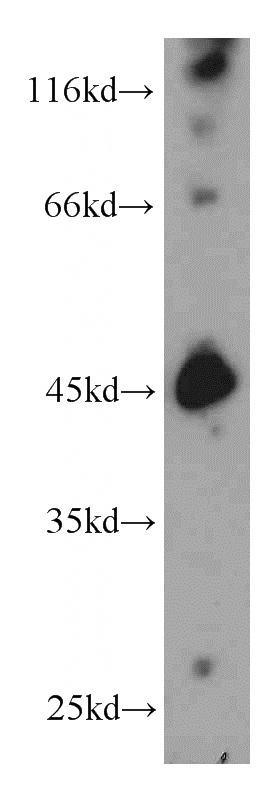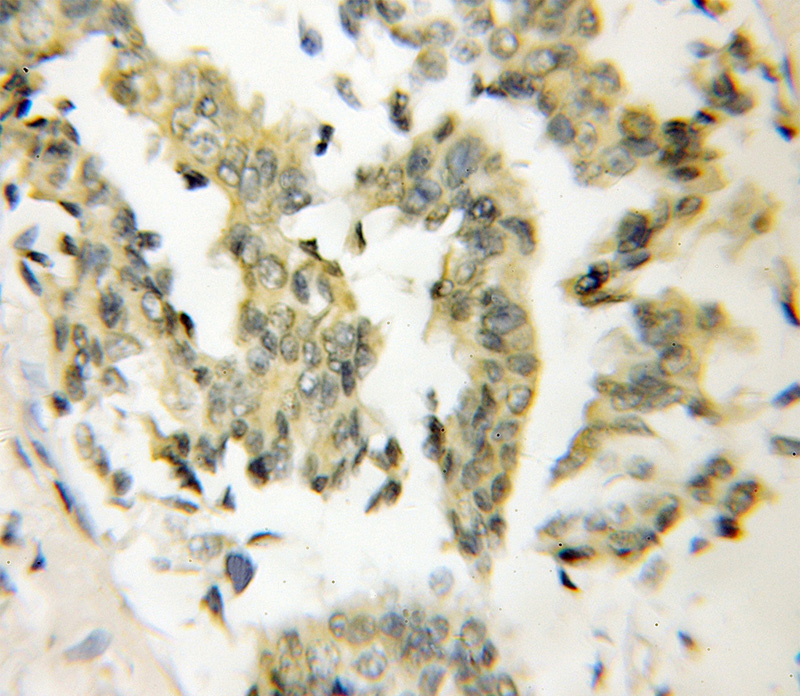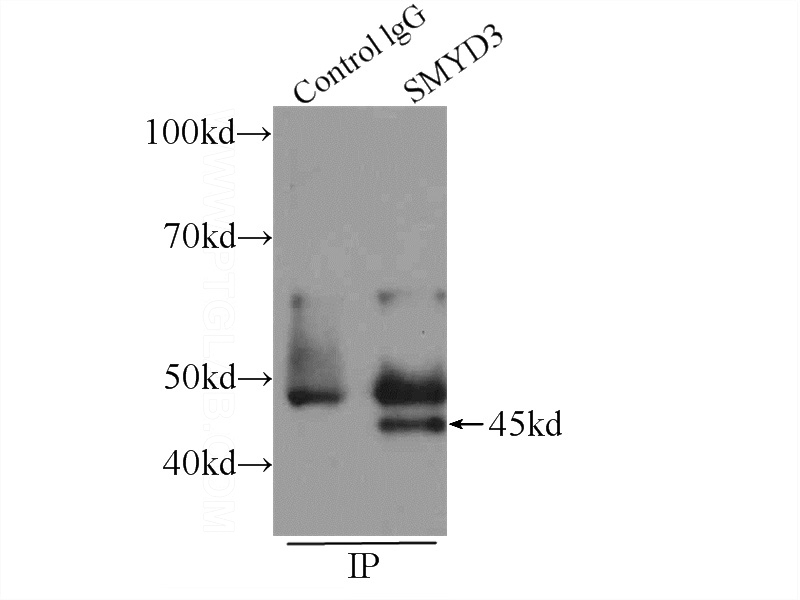-
Product Name
SMYD3 antibody
- Documents
-
Description
SMYD3 Rabbit Polyclonal antibody. Positive IP detected in COLO 320 cells. Positive WB detected in mouse brain tissue, COLO 320 cells, HeLa cells, HepG2 cells. Positive IHC detected in human breast cancer tissue. Observed molecular weight by Western-blot: 42-45kd
-
Tested applications
ELISA, IHC, IP, WB
-
Species reactivity
Human,Mouse,Rat; other species not tested.
-
Alternative names
bA74P14.1 antibody; FLJ21080 antibody; SMYD3 antibody; ZMYND1 antibody; ZNFN3A1 antibody
-
Isotype
Rabbit IgG
-
Preparation
This antibody was obtained by immunization of SMYD3 recombinant protein (Accession Number: NM_001167740). Purification method: Antigen affinity purified.
-
Clonality
Polyclonal
-
Formulation
PBS with 0.1% sodium azide and 50% glycerol pH 7.3.
-
Storage instructions
Store at -20℃. DO NOT ALIQUOT
-
Applications
Recommended Dilution:
WB: 1:200-1:2000
IP: 1:200-1:2000
IHC: 1:20-1:200
-
Validations

mouse brain tissue were subjected to SDS PAGE followed by western blot with Catalog No:115408(SMYD3 antibody) at dilution of 1:800

Immunohistochemical of paraffin-embedded human breast cancer using Catalog No:115408(SMYD3 antibody) at dilution of 1:50 (under 10x lens)

IP Result of anti-SMYD3 (IP:Catalog No:115408, 4ug; Detection:Catalog No:115408 1:500) with COLO 320 cells lysate 1280ug.
-
Background
SMYD3,also name as ZMYND1 and ZNFN3A1, belongs to the histone-lysine methyltransferase family.It is a histone methyltransferase that plays an important role in transcriptional regulation in human carcinogenesis. It can specifically methylate histone H3 at lysine 4 and activate the transcription of a set of downstream genes, including several oncogenes (e.g., N-myc, CrkL, Wnt10b, RIZ and hTERT) and genes involved in the control of cell cycle.(PMID: 20957523). It plays an important role in transcriptional activation as a member of an RNA polymerase complex. SMYD3 is frequently overexpressed in different types of cancer cells. It functions as a coactivator of Era and potentiates Era activity in response to ligand. SMYD3 as a new coactivator for ER-mediated transcription, providing a possible link between SMYD3 overexpression and breast cancer. (PMID: 19509295) The common variable number of tandem repeats polymorphism in SMYD3 is a susceptibility factor for some types of human cancer. (PMID:16155568 ) .
-
References
- Ren TN, Wang JS, He YM, Xu CL, Wang SZ, Xi T. Effects of SMYD3 over-expression on cell cycle acceleration and cell proliferation in MDA-MB-231 human breast cancer cells. Medical oncology (Northwood, London, England). 28 Suppl 1:S91-8. 2011.
- Lambrot R, Kimmins S. Histone methylation is a critical regulator of the abnormal expression of POU5F1 and RASSF1A in testis cancer cell lines. International journal of andrology. 34(2):110-23. 2011.
- Furuta M, Kozaki KI, Tanaka S, Arii S, Imoto I, Inazawa J. miR-124 and miR-203 are epigenetically silenced tumor-suppressive microRNAs in hepatocellular carcinoma. Carcinogenesis. 31(5):766-76. 2010.
Related Products / Services
Please note: All products are "FOR RESEARCH USE ONLY AND ARE NOT INTENDED FOR DIAGNOSTIC OR THERAPEUTIC USE"
